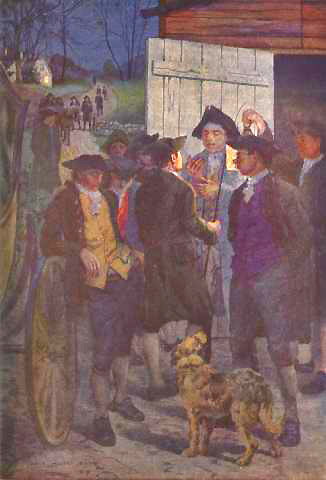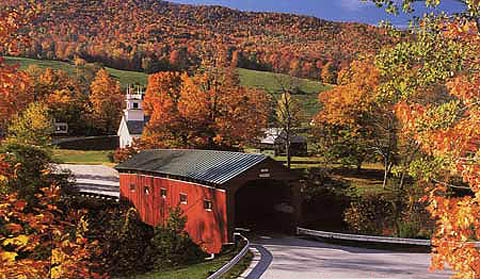SUBJECT: VERMONT SOVEREIGNTY
SOURCE: JUAN WILSON - juanwilson@mac.com
POSTED: 11 NOVEMBER 2005 - 7:30pm HST
Jumping
From the Sinking Ship of Empire

Ethan Allen on Guard by Carle Michel Boog (1877-1968) at Impressions
of the Blue Mountain Boys Exhibit
| Keynote
by James Howard Kunstler 28 October 2005 at the meeting of The Second Vermont Republic When we think about the destiny of our land, there are a few questions we might ask: What do we mean by 'our land?' What has been holding it together? Who are we? And who will we become? For about 210 years we have been a federal democratic republic composed of more than a few states, eventually adding up to fifty. At times, the citizen's identity has shifted from allegiance to a particular state to the republic as a whole - as when Robert E. Lee, for instance, famously declared that he was first a citizen of Virginia. Lately the tendency has been for citizens to think of themselves first as Americans, and secondarily as New Yorkers or Virginians or Vermonters. What has held us together - at least since the convulsion of the Civil War - is a common culture and especially the common enterprise of a great industrial economy. For much of our history, including the first half of the 20th century, we were a resourceful, adaptive, generous, brave, forward-looking people who believed in earnest effort, who occupied a beautiful landscape full of places worth caring about and worth defending. Since then, lost in raptures of easy motoring, fried food, incessant infotainment, and desperate moneygrubbing, we became a nation of overfed clowns who believed that it was possible to get something for nothing, who ravaged the landscape in an orgy of wanton carelessness, who believed they were entitled to lives of everlasting comfort and convenience, no matter what, and expected the rest of the world to pay for it. We even elected a vice-president who declared that this American way of life was non-negotiable. We now face the most serious challenge to our collective identity, economy, culture, and security since the Civil War. The end of the cheap fossil fuel era will change everything about how we live in this country. It will challenge all of our assumptions. It will compel us to do things differently - whether we like it or not. We are at or near the all-time maximum global oil production peak. We do not have to run out of oil to find ourselves in trouble. When world demand for oil exceeds the world's ability to produce oil, all the complex systems we depend on will de-stabilize. Everything from national chain retail, to the Archer Daniel Midland Cheez Doodle and Pepsi model of agriculture, to the arrangements for heating our homes and lighting our cities will begin to wobble. Some of these things will fail us and begin to change our lives. At the same time, we will be tempted to join a worldwide scramble for the world's remaining oil - most of which belongs to countries whose people don't like us - and the nature of this contest may be very violent. Our suburbs will prove to be a huge liability. They represent the greatest misallocation of resources in the history of the world. The project of suburbia represent a set of tragic choices because it is a living arrangement with no future. And that future is now here in the form of the peak oil predicament. Because they have no future, our suburbs entail a powerful psychology of previous investment that will prevent us from even thinking about reforming them or letting go of them. That's why vice-president Cheney said the American way of life is non negotiable. There will be a great battle to preserve the supposed entitlements to suburbia and it will be an epochal act of futility, a huge waste of effort and resources that might have been much better spent in finding new ways to carry on an American civilization. We might, for instance, have invested in restoring our national railroad system, which we will need desperately, because no other project we might undertake would have such a profoundly positive impact on our oil consumption. But instead we will try desperately to make cars that get better mileage, so we can continue being car dependent and continue building out and elaborating the infrastructure for a living arrangement with no future - the subdivisions of the McHouses, the strip malls, the big box pods, the deployments of hamburger shacks and pizza huts. In the service of defending suburbia, the American public may turn to political maniacs, who will promise to make the country just like it was in 1997, before we started having all these problems. In the course of this long emergency we face, life and politics are apt to become profoundly local. Many of my friends wring their hands over George W. Bush, whom they regard as the second coming of Adolf Hitler and who think the Federal government will regulate every inch of their lives. I tell them, in the long emergency the Federal government will be impotent and ineffectual - just as they were after Hurricane Katrina - and that the Federal government will be lucky if they can answer the phones five years from now, let alone regulate anybody's life. I tell them, life in America is going to become profoundly and intensely local, and it will be the local politicians you'll have to worry about. American life will become intensely and profoundly local because the complex systems that hold this nation together are going to fail. We will have to grow a lot more of our food in the regions where we live. That won't be easy. A lot of our best ag land close to our towns and cities has been paved over. A lot of knowledge has been lost. We are going to have to reconstruct local economies, local networks of interdependency - and that will not be easy given the methodical destruction of economic infrastructure to our communities by Walmart and the rest of the national chain companies over the past forty years. As these severe challenges arise, different regions of the United States will cope differently. The sunbelt will probably suffer in equal proportion to the degree that it benefited from the cheap oil fiesta of the past several decades - because it squandered its wealth in building gigantic suburban metroplexes that have no future. Atlanta, Dallas, Orlando, Charlotte. The people in these places will be full of grievance and bewilderment, and they may seek comfort in the romance of firearms in seeking to defend the indefensible entitlements their failing suburbs. The people in Phoenix and Tucson will have dreadful problems with water on top of their problems with oil and the loss of cheap air conditioning. They may not be able to grow any food of their own, locally. In Las Vegas, the excitement will be over. The capital of a something for nothing culture will be left to the wind, the tarantulas and the gila monsters. California, the most tragic part of our country -because it was once the most beautiful and is now most lost - will have many of the previously mentioned problems and the prospect of awful ethnic conflict. I am describing a nation that may not hold together far into the 20th century. I would like to be wrong about this, but it hard to look at the big picture and come up with a different set of conclusions. All parts of the United States are going to endure hardships in the decades ahead, but some regions or states may be better prepared, or just luckier. I tend to me more optimistic about the future in New England, The mid-Atlantic States, the upper Midwest, and the Pacific Northwest (if it can escape the wrath emanating out of California.) I include Vermont in this list, of course. This part of the country enjoys some advantages: an armature of towns scaled to the requirements of life in a lower energy world; a lot of good agricultural land; a civic tradition of responsible local governance; a set of regional collective character traits we associate with New England Yankees at their best: rectitude, discipline, perseverance, and allegiance to the community. I'm personally not an advocate of national breakup or secession. I grew up with United States and I have been, until recently, been pretty comfortable with the idea that we would stick together no matter what. But in the Long Emergency all bets are off for politics, economics, and social cohesion. Turbulence will be the rule and we will have to do our best to make sure that the just prevail over the wicked, and that the weak are not trampled, and that the best that was in us as a people can somehow be rescued from dumpster of memory. Anyway, I'm a New Yorker, an upstater, and I don't relish the idea of patrolling the waters of Lake Champlain in a solar electric gunboat to keep you Green Mountain boys and girls from chopping down the Adirondacks so you can bake all that granola you are reputed to subsist on. However things turn out, I hope you'll let me across the border from time to time to see how things are going. Thanks very much for your attention and good luck figuring all this out. |
THE
VERMONT INDEPENDENCE CONVENTION |
SUBJECT: VERMONT SOVEREIGNTY
SOURCE: JUAN WILSON - juanwilson@mac.com
Jumping From the Sinking Ship of Empire26
October 2005 - 10:30pm

Vermont may be cute but it is prickly
Vermonters
Move to Secede From USA |
See also:
Island Breath: Bumpy does Sovereinty
Island Breath: Stop the Akaka Bill
Island Breath: Francis Bolye Speaks on Sovereignty
Pau